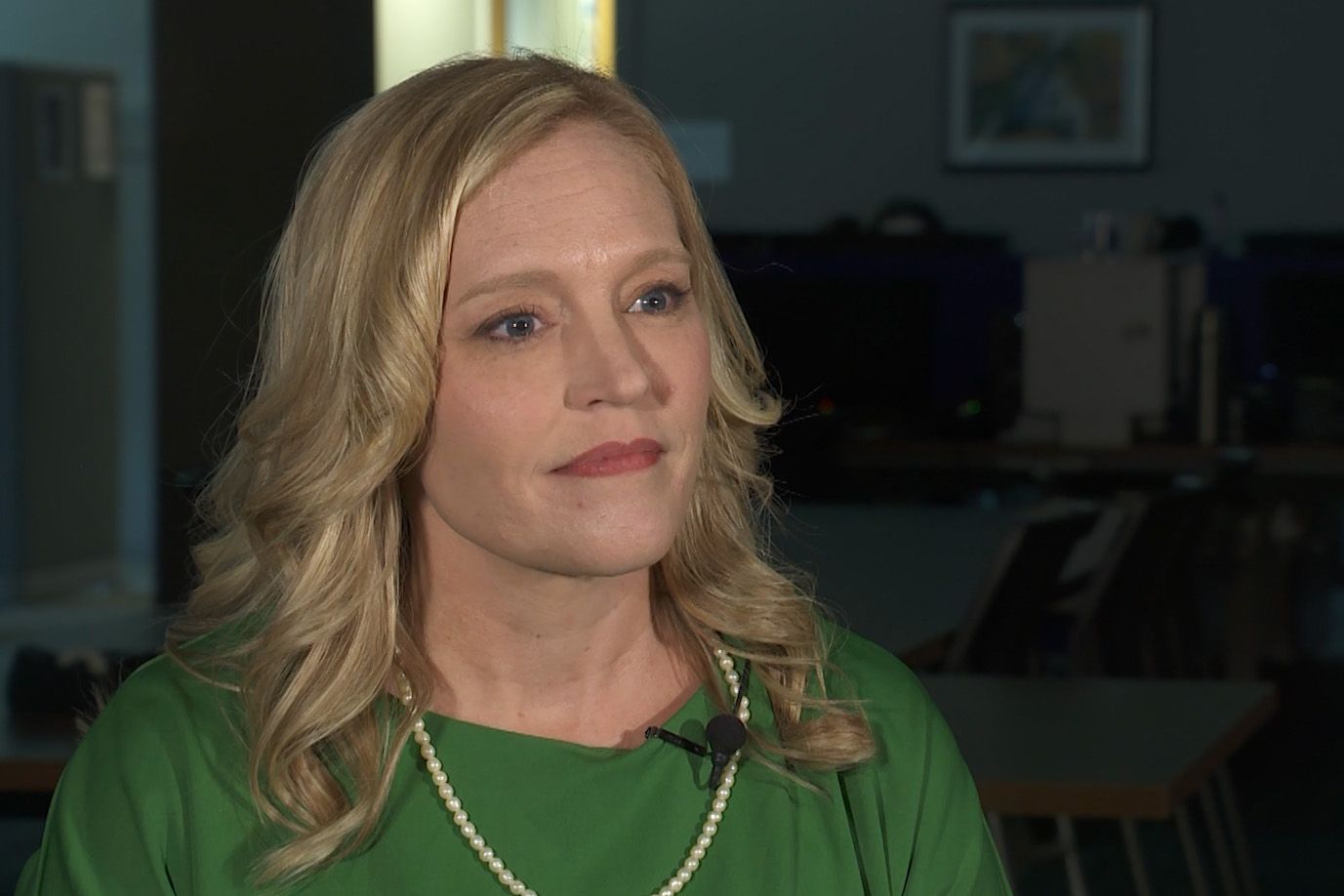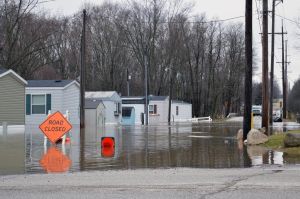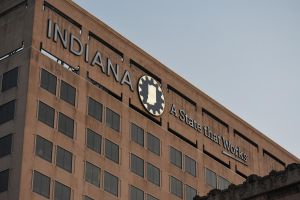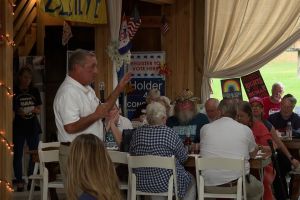
Erin Houchin is the Republican nominee for Indiana's 9th Congressional District. Houchin ran for the same seat in 2020 and lost in the primary to incumbent Trey Hollingsworth. (Devan Ridgway, WFIU/WTIU News)
As part of WTIU/WFIU News’ 2022 election coverage, reporter Holden Abshier invited the three candidates running for Indiana’s 9th Congressional District to discuss their policy positions.
The three candidates are Tonya Millis, Libertarian of Mitchell; Matt Fyfe, Bloomington Democrat; and former state senator Erin Houchin, Republican from Salem.
Indiana’s 9th District consists of 17 and one-third counties: Brown, Clark, Dearborn, Decatur, Floyd, Franklin, Harrison, Jackson, Jennings, Jefferson, Lawrence, Monroe, Ohio, Ripley, Scott, Switzerland, and Washington counties, with part of southern Bartholomew County.
The conversation with Tonya Millis can be found here.
The conversation with Matt Fyfe can be found here.
This conversation has been edited for clarity and conciseness.
Holden Abshier: You started serving as a state senator for District 47 in 2014, and you served up through February this year. How did you originally get involved in politics? How did you get into that state senator role?
Erin Houchin: I was a senior at IU, and I interned in the state Senate as a senior there. That's what really got me interested in serving in government. After the internship, I literally called the statehouse every Friday for six weeks in a row until I got a job. I worked as a legislative assistant, I ended up getting my master's in political management, worked for U.S. Sen. Dan Coats as his regional director, and that's what led to my service in the state Senate and where we are now today.
HA: What do you think was your biggest accomplishment while you were at the Statehouse?
EH: It's definitely the broadband initiative. My broadband legislation became the Next Level Connections Grant Program that has been funded now to the tune of about $350 million of investment in Indiana. My Senate district was the most unserved part of the state of Indiana, and I had talked to stakeholders and said, “what can we do to get a broadband in these rural areas?” They said, “return on investment.” Return on investment wasn't going to be there, so we came up with a public-private partnership type of a program. Ultimately, that legislation has led to going from 17 percent access in Indiana with one Gig speeds to now, since the passage of the bill, 87 percent of the state has access to one Gig speeds.
HA: Why did you decide to run for the 9th District?
EH: My parents always taught me if you can do something, you should. I've got a level of experience working for Senator Coats, as a small business owner, as a mom, former caseworker for Child Services, and then of course, the state legislature. That wide variety of experience, I think, lends to the opportunity to keep serving and serve at a higher level. We're definitely looking forward to going to Washington to fight for this district, just as we have been for the last eight or so years in the state Senate.
HA: Did redistricting factor into your decision to run again?
EH: No, it really didn't. My Senate district, of course, we had a significant change in redistricting. I was looking forward to running for re-election to the state Senate. When Trey Hollingsworth announced he was not seeking reelection, that really put this decision on a fast track. Talked to the family and our kids, who are 18, 16 and 13. I got their input and encouragement and decided that it was the right thing to do to step up and serve the country.
HA: What makes you the right candidate for the 9th District?
EH: I think in this environment in particular, when I'm out and about talking to voters, they're asking for a check and balance on this administration. So, I certainly fit that profile to be a check and balance. And I'm also known as a fighter, not just on partisan issues, but all issues, like the broadband initiative that we worked on. I've worked on dyslexia screening, helping children in foster care. There's plenty of issues that we've worked on that are nonpartisan, that just take a lot of hard work, and we certainly fit that bill.
HA: Right now, what do you think is the biggest issue facing voters in the 9th District?
EH: Definitely inflation is impacting families every single day. I hear about it on my social media pages, as well as just in interactions with others. I know that they're experiencing it because I feel it, too, as a mom every time we go to the grocery store. So, inflation and the spending in Washington, which is contributing to the inflation, is certainly top of mind for our voters in this district.
HA: How willing are you to reach across the aisle and work with Democrats who bring legislation forward?
EH: I think that state legislators are uniquely qualified because we have worked with the other side. I’ve worked with Democrats on lots of issues - adoption subsidies, dyslexia, foster care, broadband. Most of the things that we worked on at the state legislative level were bipartisan. There's a shortage of that in Washington, D.C., but I think there are certainly ways that we can find to work together. I've had that experience at the state level, which I think makes it more likely to have some agreement where we can find it. I would say that there are some issues we're not going to agree on, but when we can find that agreement, we should be able to work together.
HA: If you are elected, what would be the single issue that might rise to the top of your agenda?
EH: I'm not sure there's a single issue. I'm usually focused on what is in the interest of the voters in the district. It's why I brought the broadband legislation. It's why I worked on many of the initiatives that I worked on at the state legislative level. They came from constituents. So we're hearing about inflation, we're hearing about border security. One of the things I think that we can get to work on is just government accountability. We have a situation in the federal government now where a lot of people are unelected and bureaucratic roles, and they're making decisions on behalf of the people, and decisions that really should be left to their elected representatives. So, I'm looking forward to restoring that balance.
HA: I want to turn now to some more issue-specific questions and your policy stances. We'll start with abortion - the topic of the summer mostly. Can you give me your thoughts overturning Roe v Wade? And do you think abortion is a national issue that Congress should address?
EH: Well, I'm pro-life and I haven't shied away from that in my service in the state legislature. I do think that the decision to overturn Roe v Wade and send it back to the states was the correct one. I think the government closest to the people is best. There is a role for the federal government - we've got things like the Hyde Amendment and other things that the federal government does weigh in. In general, though, I’m a Federalist that believes that states make the best government, and the best government is closest to the people.
HA: I know you weren’t in the legislature at the time of the special session, but do you have any thoughts, or do you support Indiana's near-total abortion ban?
EH: Well, I wouldn't categorize it as a near-total abortion ban. But, you know, the Republicans on this issue don't have a radical position. The radical position has been held by Democrats in Congress that have voted for abortion all the way up to the ninth month of pregnancy. I think that [Indiana] Senate Bill One struck a balance as it was finally ended, and I would have voted for that legislation.
HA: Let’s turn to the Supreme Court. Do you have any thoughts or opinions or concerns about any upcoming cases that they are hearing this session? I know they’ll be looking at states’ powers in federal elections and voting rights, affirmative action, and religious freedom.
EH: I haven't been following the Supreme Court cases. So, I don't really have an opinion. I will say that in terms of elections, I think that they should be managed by the states and not federally.
HA: Do you feel that in Indiana or in the United States we need to do a better job to protect or to secure our elections?
EH: Yeah, I had some legislation on this issue. It was absentee ballot security. We ended up passing legislation that did require voter ID for absentee ballots when they're asked for online. I think we could continue to secure our elections by requiring voter ID for all types of voting. We do have it for in-person voting. We have had that for many years. We most recently have it for absentee ballot online requests. And I think we could also strengthen our security by requiring voter identification and for absentee ballot applications by mail.
HA: Looking at the 2020 election, do you believe Joe Biden is the rightfully elected president?
EH: I think there were some irregularities. I think during COVID we made some changes - secretaries of states, governors - they made changes to election laws that certainly were not constitutional. But we did have that election certified. I don't think that we should re-litigate the past. We should just make sure that the elections moving forward that the public has confidence and faith that they are the outcome that is established.
HA: Turning now to the Second Amendment. Some statistics from the Gun Violence Archive- they’ve reported that this year there have been 519 mass shootings, more than 1,200 accidental shootings, more than 1,000 children or teenagers were killed this year. More than half of the gun deaths were suicide. Do you think America has a problem with gun violence? And how might we address it?
EH: I think we have a problem with soft on crime policies that end up contributing to these things. We have had prosecutors that aren't prosecuting many cases, we have programs or initiatives to defund the police. So, we have had a problem with being soft on crime and not holding people accountable. I think that certainly contributes to the violence that we see in the country. And we should focus on those efforts to support the police and to encourage our prosecutors to follow the law and prosecute criminals when they commit violent acts.
HA: Do you support Indiana’s permit-less carry bill?
EH: I do, and I think we saw that with the Greenwood case where it was a good guy with a gun that thwarted that situation within eight seconds. So, I do support that.
HA: I want to turn a little bit to inflation since that is the biggest issue facing voters here in the 9th District. What should the United States do to address inflation?
EH: We definitely have to slow and stop spending. We have to cut the rate of spending. We're at $31 trillion now of national deficit. Republicans and Democrats over the years have been responsible for increasing our spending, but it's not sustainable. The Biden Administration really has put the pedal to the metal in terms of spending, and we have to cut back on spending if we're going to get inflation under control.
HA: Recently, the Biden Administration made a decision to forgive either $10,000 or $20,000 in student loans for qualified individuals. Do you support that decision?
EH: I don't support that decision because many people made decisions based on whether or not they would have to take on student loans. So, 300,000, roughly, Hoosiers benefited from this student loan buyout, and that is at the expense of 6.3 million other people who may have made a decision to pay their own college education or not choose that route. I just think it's fundamentally unfair, and I don't think that's constitutional.
HA: The last specific issue I want to address - probably the lightest of them all - Daylight Saving Time. The Senate approved the Sunshine Protection Act; the House has yet to act on it. In 2008, the staff at the US Department of Energy found that by extending Daylight Savings for just four weeks saves have half a percentage point on daily electricity use. So I'm asking you, do you support the Sunshine Protection Act if the House were to come around?
EH: I haven't seen the Sunshine Protection Act. So, I don't want to comment on whether I would vote for something that I haven't seen. But I certainly will take a look at that and listen to Hoosiers and how they feel on this issue.
HA: Have you listened to any Hoosier farmers who might have concerns about Daylight Savings?
EH: What I've heard about Daylight Savings in the past is that people are concerned about kids getting on the school bus too early or, you know, before the sun comes up. But, you know, there's a wide variety of debate on this issue. People were generally not pleased when Indiana established Daylight Savings Time back before I was in the legislature. So, I haven't heard from many during the course of this election, but I certainly will be listening to what Hoosiers want on this topic if it does come before me in Congress.
HA: I do have one final question - what makes you the right candidate for the 9th District?
EH: Again, I think voters want a check and balance on this administration, and I bring that as the Republican candidate in this race. I'm also known as a fighter on behalf of Indiana and Hoosiers and on the issues that are most important, and I'm ready to go to Washington to fight for us.











